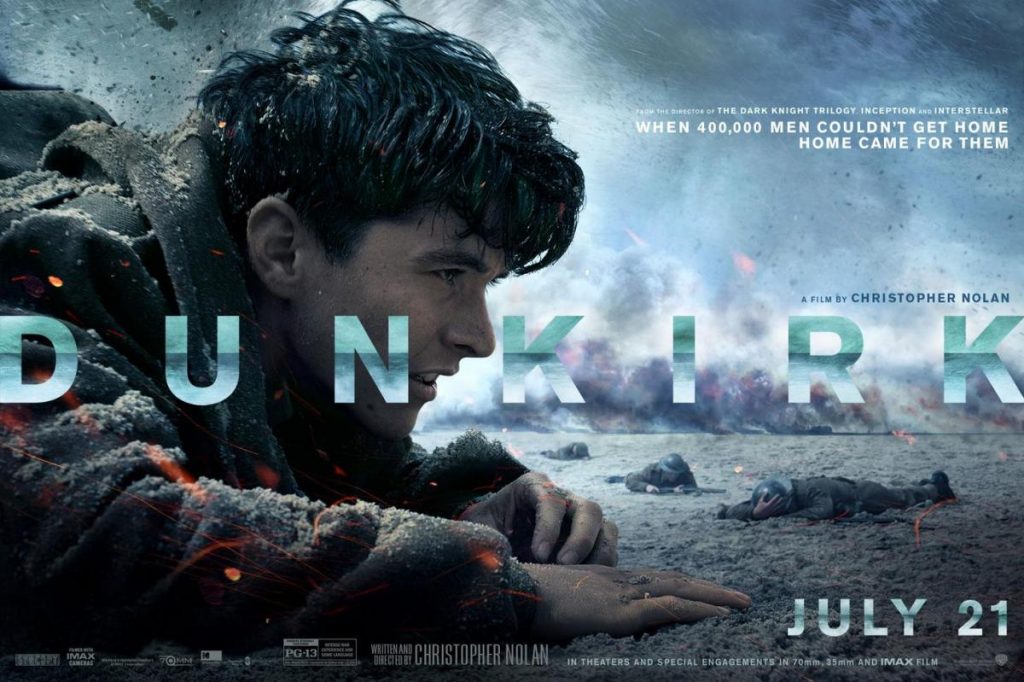
Bulletin #110 – Aug 2017
Dunkirk

August 14, 2017
Review by MICHAEL F. BISHOP
But the “Miracle of Dunkirk” soon became a source of great pride to the British people—a symbol of triumph over adversity. And the preservation of the British Expeditionary Force meant that Churchill could plausibly pledge to keep on fighting.
This hinge of history is the subject of Christoper Nolan’s thrilling and immersive new film, Dunkirk. From the opening scene, the viewer is plunged into the chaos and horror of the evacuation, as we follow one young soldier with the symbolic name of Tommy as he runs from the town to the beach, dodging fire.
The action never lets up. Shot in 70mm IMAX film, Dunkirk follows the travails of characters on land, sea, and air—each element with a different timeline.
On land, the action is followed for a week, as British troops are depicted acting variously with bravery, cowardice, and resignation in the face of Stuka dive bombers and overcrowded ships that present easy targets for German assault. Tommy, portrayed by newcomer Fionn Whitehead, endures multiple close calls and near-escapes. He and his compatriots (including another soldier played convincingly by pop star Harry Styles) effectively convey the vulnerability and soul-searing terror of soldiers for whom home was so near, yet so far. Overseeing the evacuation is a naval officer played by Sir Kenneth Branagh with his customary aplomb, who, chorus-like, sets the scene and charts the progress of the evacuation.

2024 International Churchill Conference
On sea, the action unfolds over a single day, as a stoic Mark Rylance, accompanied by his son and another young man, embark in a small pleasure craft for Dunkirk, determined to play a part in the rescue effort. Rylance radiates a quiet decency and a stalwart determination to do his bit.
In the air, we follow two Spitfires engaged for an hour in deadly dogfights with enemy aircraft, rendered with dazzling skill by director Nolan. One of the pilots is played by Tom Hardy, his face partially masked for most of the movie (rather like his appearance as the villain Bane in Nolan’s The Dark Knight Rises), but his expressive eyes and heroic actions are more than enough to win the sympathy and the anxious concern of the viewer. Though his Spitfire has a suspiciously large supply of ammunition, there is something deeply satisfying about watching him send Messerschmitts and Stukas cartwheeling into the sea.
Complex though it may sound, Nolan deftly weaves these narrative strands together, and the various characters encounter each other in dramatic and satisfying fashion.
Nolan’s fealty to realism has its drawbacks—the judicious application of CGI might have populated the beaches with the teeming hordes of soldiers present in 1940, and camouflaged the suspiciously modern houses on the seafront.
And when the exhausted soldiers board a train in England after their deliverance, they sink into seats with upholstery that evokes the 1970s more than the 40s.
But these are mere quibbles. By the film’s rapturously beautiful climax, featuring a gliding Spitfire, a blazing sunset, the strains of Elgar’s “Nimrod,” and the words of Churchill intoned by a young soldier, most viewers will have been swept away by Nolan’s vision of those fateful days when civilization hung in the balance.
Nolan has been criticized in some quarters—most notably by Dorothy Rabinowitz in the Wall Street Journal—for failing to provide more historical context, and for not depicting Churchill onscreen.
But this is unfair—and rather beside the point. Nolan has made a film about the experience of those at the sharp end of the German assault—and few of them were consumed with thoughts of a prime minister less than three weeks in office. And besides, this year’s atrocious Churchill with Brian Cox in the title role is proof that merely having the great man as a character is no guarantee of quality—or historical verisimilitude.
Christopher Nolan has done a great service by fashioning a patriotic and historical epic of a type rarely seen anymore, a welcome break from the endless parade of computer-generated “superheroes” engaged in noisy and meaningless combat. And his evocation of Churchill’s great post-Dunkirk speech is haunting and restrained.
Dunkirk brings to unforgettable life one of the most important chapters of the desperate struggle waged by Britain “until, in God’s good time,” as Churchill boldly predicted upon the completion of Operation Dynamo, “the New World, with all its power and might, steps forth to the rescue and the liberation of the old.”
Michael F. Bishop is the Executive Director of the International Churchill Society.
Subscribe
WANT MORE?
Get the Churchill Bulletin delivered to your inbox once a month.




